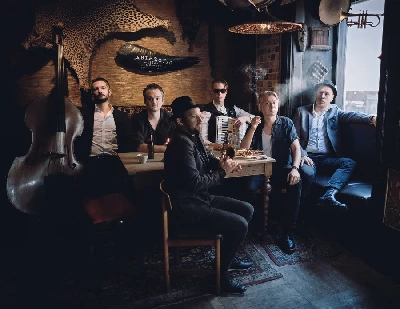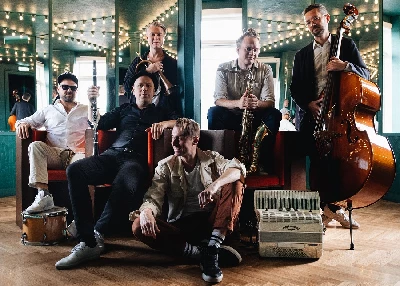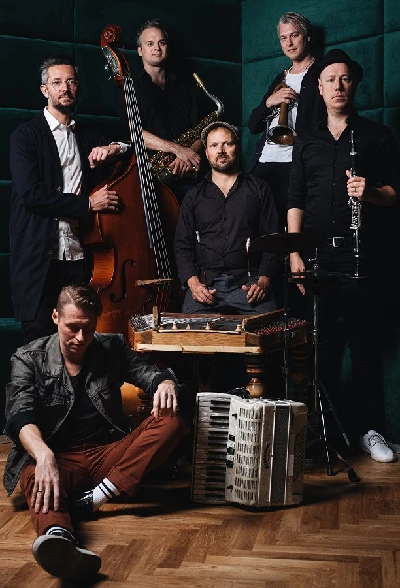published: 8 /
9 /
2022

Copenhagen’s award-winning sextet Mames Babegenush is a Klezmer band which has put an exciting twist on this traditional genre. They’re currently touring and have recently recorded their sixth album.
Article
Double bassist Andreas Mollerhoj, saxophonist Lukas Rande, drummer Henrik Hansen, accordionist Nicolai Kornerup, flugelhornist Bo Rande and clarinetist Emil Goldschmidt are Mames Babegenush. These six versatile musicians perform Klezmer music, a unique genre that originated in Eastern Europe and has traditionally been performed at celebratory events.
The Copenhagen band formed in 2004. Since that time, the sextet has been honoured with awards by both the Jewish Music Festival in Amsterdam and the Danish Music Award for Best World Album of The Year. Interestingly, although Mames Babegenush specialises in Klezmer, they have also fused this time-honoured genre with exciting contemporary beats on select original compositions.
Although the band had to cancel tour dates over the past two years due to Covid-19, they are now moving full-speed ahead with their sixth album amid a flurry of tour dates. In this interview with Pennyblackmusic, saxophonist Lukas Rande has kindly offered to answer questions about band history and so much more.
PB: How did the six members of your band meet? What are your musical backgrounds? Are you self-taught or classically trained?
LR: We’re childhood friends, all of us. Some of us met in the Tivoli Boys Guard (marching band in the old Tivoli amusement park in the centre of Copenhagen) and some in high school. Most of the band members studied at the Rhythmic Conservatory in Copenhagen and a couple are self-taugh with diverse musical backgrounds, from classical music to folk, jazz, electronic music and pop/rock.
PB: What initially attracted the band members to Klezmer music? Did any specific recordings or other working Klezmer groups influence the band’s trajectory?
LR: Our clarinetist Emil was brought up with the music mostly through his dad, Henrik Goldschmidt, a wonderful classically trained oboist. So Emil was already into the music, and he gathered us for our first show twenty years ago. The energy and intensity of the music was hugely inspiring for all of us, and we spent the first five years or so getting to know the roots of the music. Back then we were very into some of the first Klezmer recordings from the 1910 and 1920s, with artists like Naftule Brandwein and Dave Tarras.
PB: Under what conditions did Klezmer music flourish in Eastern European historically?
LR: Some aspects of how Klezmer music evolved, traditionally speaking, are actually also some of the things that are attractive to us as a group. In the sense that Klezmer, historically speaking, has been highly influenced by the surrounding musical traditions and cultures. For us, related genres throughout Eastern Europe and North Africa have been a big influence, like Romanian, Bulgarian, Serbian and Turkish music. Plus, the fact that all of us grew up in the 1980s in Denmark, we were surrounded by pop music, jazz which has a beautiful and rich history in Copenhagen, as well as Danish and Scandinavian folk music.
PB: Regarding the ‘Trentemoller’ remix: What elements did you fuse with the traditional to create this contemporary treatment?
LR: We’re friends with Trentemøller, and it just made sense to ask him to do a remix of one of our songs. We did the song after having released a pretty experimental Mames album together with different vocalists and producers. So, we felt it would be fun to get Trentemøller to do a remix as a single leading into our fourth album release, giving him the files and letting him freely choose what to use and what not to use. The remix ended up being a great blend of electronic music and a pretty traditional song of ours. It has an open minded and inviting energy to it, actually very much like the video for the song, with loads of different YouTube home videos of people from around the world dancing to the music:
https://www.youtube.com/watch?v=66CfgCgH-lc&ab_channel=fullmoonvideos81
PB: ‘La Loteria En Babelonia’ is another illuminating remix. What reactions have you got? Is this remix being played at dance clubs?
LR: Yes, it has been played a lot at clubs I think… It’s a great song, which actually was the second single leading up to our fourth album. DJ Click, a French DJ we know, did this remix together with the great DJ Galletas Calientes, based in Colombia.
PB: Is there an improvisational component to your music or are your arrangements fixed?
LR: Much of the arrangements are open and up to each of us. Since we as a group have been together for such a long time, most of our arrangements are actually not planned or calculated. Most often when we pick up a new song, one of us presents it to the group with the melody and perhaps some harmonies. From there we find an arrangement together, and, although we most often plan out an overall form of a song, we try to keep as much as possible free and open.
PB: Do you see a relationship between Klezmer and other genres? American jazz? Blues?
LR: Yes, sure. Klezmer shares a lot of common ground with a lot of different genres and it’s pretty much up to who is playing it to figure out how they feel about this.
PB: Regarding: ‘Fantasi for Trommer, Strygere & Harpe’: The strings play a strong role in this piece, but the arrangement begins with solo percussion and percussion remains a force. How did you balance out these colors?
LR: This one actually started with our drummer improvising alone in the studio. We listened to it and decided to use all of it as the last track of the album. There was something magical about the drums that had different moods and levels, making the improvisation sound almost like a composed song. Nicolai, our accordionist, did a string arrangement for a string quartet we had worked with before based on the recorded solo, and then we invited a percussionist and a harp player to play on this track as well.
PB: What are your plans for touring over the coming years?
LR: To tour as much as possible. Our band is very much about live music so we really want to do this as much as possible these coming years. This year has been so great with things finally opening up after time without live music, and we’ve been able to do some of the shows that were canceled the last couple of years. We’re just about to go on our seventh tour in the US and also our first ever tour in Canada, which is very exciting. The tour takes us to the Midwest, Chicago and the East Coast plus Canada as mentioned with thirteen shows in nine states. Apart from this, we regularly tour around Europe and Scandinavia, so we are very much looking forward to touring again.
PB: What can Mames Babegenush fans expect from the upcoming sixth album?
LR: We finished recording this recently actually, and we’re all very happy about the music. Like our last album, we recorded it live in front of an audience, recording in the same room with all musicians set up close together doing one-takes and focusing on spontaneous live energy, presence and intimacy. The music reflects where we are as a group and also introduces a new instrument we added to the group, with our drummer Morten playing both drums and cymbalom.
PB: Thank you.
Band Links:-
https://www.mames.dk/
https://www.facebook.com/mamesbabegenu
https://twitter.com/mamesbabegenush
Play in YouTube:-
Picture Gallery:-

